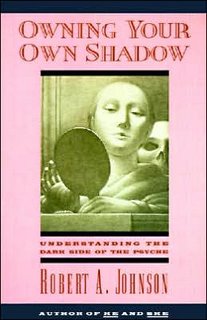 I recently picked up this one, so I am by no means finished with it. One thing that stands out to me is that Johnson's perspective on psychology comes across as deeply rooted in Christianity, which really challenges my personal bias for the moment. Several years ago, this would not have bothered me so much, but I am mentally weary from the right-wing political Christian perspective constantly being shoved down my throat.
I recently picked up this one, so I am by no means finished with it. One thing that stands out to me is that Johnson's perspective on psychology comes across as deeply rooted in Christianity, which really challenges my personal bias for the moment. Several years ago, this would not have bothered me so much, but I am mentally weary from the right-wing political Christian perspective constantly being shoved down my throat. Still, I am open enough to give this book the good old college try. This work is divided into three parts: 1. The Shadow, 2. Romantic Love as Shadow, and 3. The Mandorla.
So, what is the shadow? Johnson introduces his brief work by stating that it is . . .
". . . what we would like to be and how we wish to be seen by the world. It is our psychological clothing and it mediates between our true selves and our environment just as our physical clothing presents an image to those we meet." (p. 3)
As with other books of this genre (psychology), the first thing I did was flip through to the parts that might be most relevant to me today. Here is an excerpt that stands out:
"To fall in love is the project the most noble and infinitely valuable part of one's being onto another human being, though sometimes under rare circumstances it may be projected onto something other than a human. . . . . . Romantic love, or falling in love, is different from loving, which is always a quieter and more humanly proportioned experience. There is always something overblown and bigger-than-life about falling in love." (p. 61-62)I like the way Johnson differentiates between the two experiences as being distinct from one another. Still, I cannot help but think that being in love usually begins with falling in love, so I am wondering how he addresses the melding of the two.
Also, I have yet to learn what the heck a Mandorla is, so I am somewhat curious.
No comments:
Post a Comment